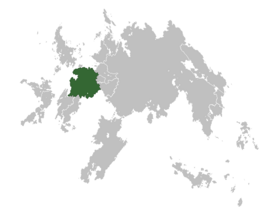User:Finium/Sandbox3: Difference between revisions
Jump to navigation
Jump to search
No edit summary |
No edit summary |
||
| Line 132: | Line 132: | ||
|stat_area1 = <!-- area in square kílometres (w/o commas or spaces), area in square miles is calculated --> | |stat_area1 = <!-- area in square kílometres (w/o commas or spaces), area in square miles is calculated --> | ||
|stat_pop1 = 22,011,803 | |stat_pop1 = 22,011,803 | ||
|stat_year2 = | |stat_year2 = 1800 | ||
|stat_area2 = | |stat_area2 = | ||
|stat_pop2 = | |stat_pop2 = 31,183,388 | ||
|stat_year3 = | |stat_year3 = 1940 | ||
|stat_area3 = | |stat_area3 = | ||
|stat_pop3 = | |stat_pop3 = 76,124,153 | ||
|stat_year4 = | |stat_year4 = | ||
|stat_area4 = | |stat_area4 = | ||
Revision as of 17:52, 6 December 2019
Cathartic Empire of Cornicae | |||||||||||||
|---|---|---|---|---|---|---|---|---|---|---|---|---|---|
| Anthem: Hymn of the Wood | |||||||||||||
 | |||||||||||||
| Capital | Cambra | ||||||||||||
| Religion | Cathartic Ditanery | ||||||||||||
| Demonym(s) | Cornice | ||||||||||||
| Government | Monarchy | ||||||||||||
| High King | |||||||||||||
• 1605-1665 | Marius I | ||||||||||||
• | ... | ||||||||||||
• 1905-1943 | Peter X | ||||||||||||
| Population | |||||||||||||
• 1700 | 22,011,803 | ||||||||||||
• 1800 | 31,183,388 | ||||||||||||
• 1940 | 76,124,153 | ||||||||||||
| |||||||||||||
| |||||||||||||
The Cathartic Empire of Cornicae, later called the Lavarian Empire, was a large imperial state in western Gaia that was active from the early 17th century to shortly after the conclusion of the Continental War. Prior to the Piloro's endorsement of the reigning monarch Marius I, the House of Cambra ruled a parallel state called the Kingdom of Cardeale and Bracelon. In 1605, the Piloro recognized Marius I as the paramount physical authority of Ditanery and legitimized his annexation of Brilliania, during which he deposed the Marist Princes who had previously denied the religious authority of the Piloro.